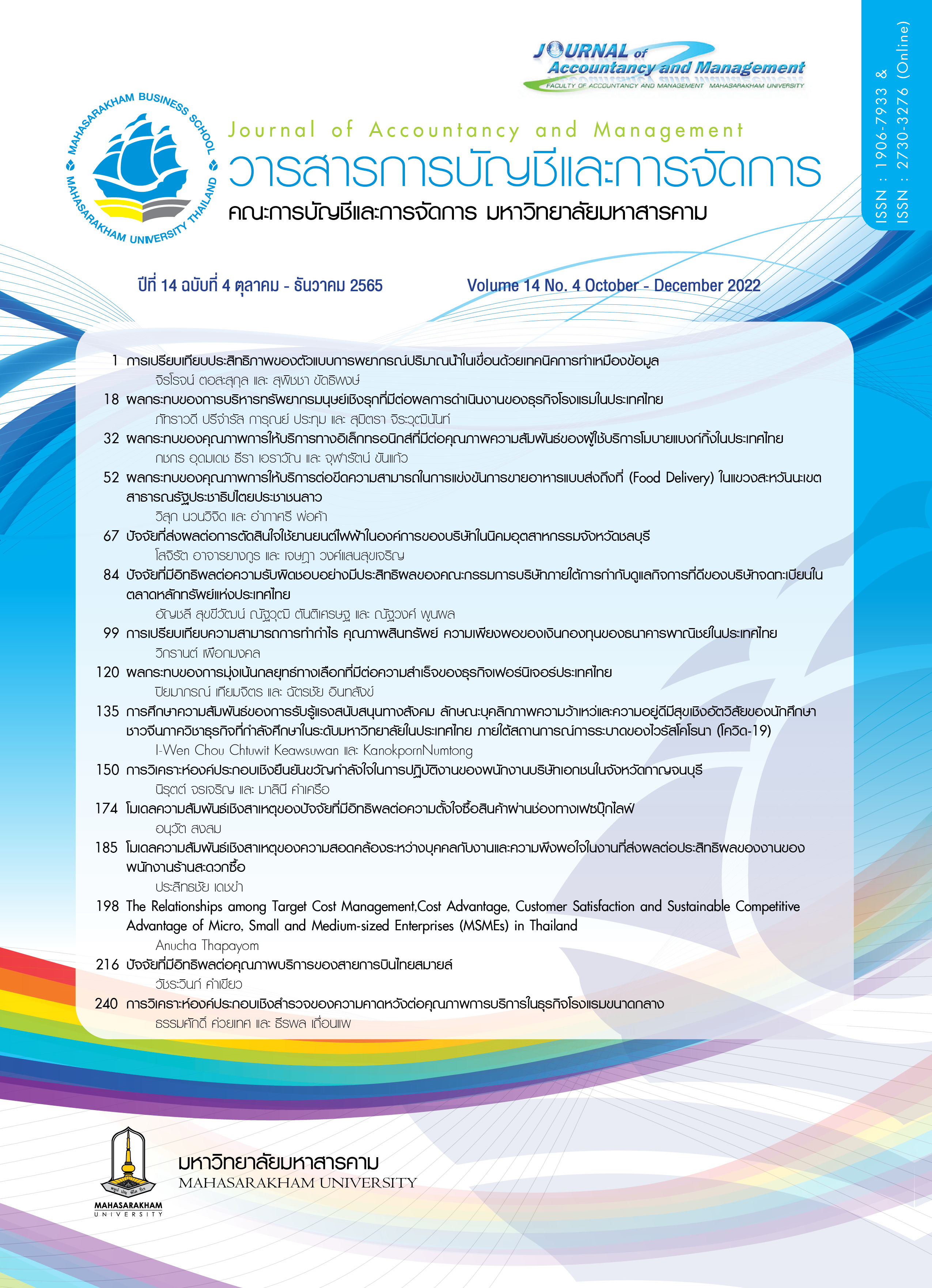ผลกระทบของการบริหารทรัพยากรมนุษย์เชิงรุกที่มีต่อผลการดำเนินงานของธุรกิจโรงแรมในประเทศไทย
Main Article Content
บทคัดย่อ
การวิจัยครั้งนี้มีวัตถุประสงค์ เพื่อทดสอบผลกระทบของการบริหารทรัพยากรมนุษย์เชิงรุกที่มีต่อผลการดำเนินงานของธุรกิจ โดยใช้แบบสอบถามเป็นเครื่องมือในการเก็บรวบรวมข้อมูลจากกลุ่มตัวอย่างเป็นผู้บริหารธุรกิจโรงแรมในประเทศไทย จำนวน 103 คน สถิติที่ใช้ในการวิเคราะห์ข้อมูล ได้แก่ ร้อยละ ค่าเฉลี่ย ส่วนเบี่ยงเบนมาตรฐาน การวิเคราะห์สหสัมพันธ์พหุคูณ และการวิเคราะห์การถดถอยแบบพหุคูณ ผลการวิจัย พบว่า การบริหารทรัพยากรมนุษย์เชิงรุก ด้านการดูแลใส่ใจและรักษาบุคลากร และด้านการบริหารการเปลี่ยนแปลง มีความสัมพันธ์และผลกระทบเชิงบวกกับผลการดำเนินงานโดยรวม ดังนั้น ผู้บริหารธุรกิจโรงแรมในประเทศไทยจึงควรให้ความสำคัญกับแผนปฏิบัติการด้านค่าตอบแทนที่เป็นตัวเงินและสวัสดิการต่าง ๆ เพื่อแสดงถึงการดูแลเอาใจใส่และการคำนึงถึงการรักษาบุคลากรไว้กับองค์กร ควบคู่ไปกับการวางแผนการบริหารความเปลี่ยนแปลง มุ่งเน้นการเตรียมความพร้อมพนักงานให้มีความรู้ ความสามารถ และวิธีคิดในการปรับตัวเข้ากับการเปลี่ยนแปลงของเทคโนโลยีสารสนเทศ เศรษฐกิจ สังคม และภัยพิบัติในรูปแบบต่าง ๆ ที่อาจจะเกิดขึ้น
Downloads
Article Details

อนุญาตภายใต้เงื่อนไข Creative Commons Attribution-NonCommercial-NoDerivatives 4.0 International License.
บทความที่ได้รับการตีพิมพ์เป็นลิขสิทธิ์ของวารสารการบัญชีและการจัดการ
ข้อความที่ปรากฏในบทความแต่ละเรื่องในวารสารวิชาการเล่มนี้เป็นความคิดเห็นส่วนตัวของผู้เขียนแต่ละท่านไม่เกี่ยวข้องกับมหาวิทยาลัยมหาสารคาม และคณาจารย์ท่านอื่นๆในมหาวิทยาลัยฯ แต่อย่างใด ความรับผิดชอบองค์ประกอบทั้งหมดของบทความแต่ละเรื่องเป็นของผู้เขียนแต่ละท่าน หากมีความผิดพลาดใดๆ ผู้เขียนแต่ละท่านจะรับผิดชอบบทความของตนเองแต่ผู้เดียว
เอกสารอ้างอิง
กรมพัฒนาธุรกิจการค้า. (2554). ประเภทข้อมูลธุรกิจ. ค้นเมื่อ 23 พฤศจิกายน 2561, จาก http://www.dbd.go.th/ewt_news.php?nid=603&filename=Template_Design_Temp_Sub
โกกิลาวัจน์ หันจางสิทธิ์ และฉัฐวัฒน์ ลิมป์สุรพงษ์. (2558). การจัดการทรัพยากรมนุษย์และผลการดำเนินงานกรณีศึกษาธุรกิจโรงแรมมาตรฐาน 3-5 ดาว ในเขตพื้นที่ภาคตะวันออกเฉียงเหนือของประเทศไทย. วิทยานิพนธ์ บริหารธุรกิจมหาบัณฑิต. กรุงเทพฯ : มหาวิทยาลัยเกษตรศาสตร์.
ชัชราวรรณ มีทรัพย์ทอง จิราวรรณ คงคล้าย และเฉลิมชัย กิตติศักดิ์นาวิน. (2559). การบริหารทรัพยากรมนุษย์ในศตวรรษที่ 21, วารสารธุรกิจปริทัศน์, 8(1), 183-197.
ณัฐวุฒิ พงศ์สิริ. (2561). HR Trend 2019 จับตาทิศทางการบริหารงาน HR ในปีหน้า. ค้นเมื่อ 20 พฤษภาคม 2562, จาก https://www.dharmniti.co.th.
บุญชม ศรีสะอาด. (2554). การวิจัยเบื้องต้น. กรุงเทพฯ : สุวีริยาสาส์น.
พัฒน์ภูมิ แสนศักดิ์. (2559). ผลกระทบของกลยุทธ์การบริการสมัยใหม่ที่มีต่อผลการดําเนินงานของธุรกิจโรงแรมในประเทศไทย. วิทยานิพนธ์ บริหารธุรกิจมหาบัณฑิต. มหาสารคาม : มหาวิทยาลัยมหาสารคาม.
ประคัลภ์ ปัณฑพลังกูร. (2560). องค์กรของท่านเป็น HR เชิงรุก หรือ เชิงรับ. ค้นเมื่อ 9 มิถุนายน 2560, จาก https://prakal.wordpress.com.
ปาริณี สถาพรมงคลเลิศ. (2560). ผลกระทบของการบริหารเชิงกลยุทธ์ทางเศรษฐศาสตร์ที่มีต่อความสำเร็จในการดำเนินงานของธุรกิจโรงแรมในประเทศไทย. วิทยานิพนธ์ บริหารธุรกิจมหาบัณฑิต ; มหาสารคาม : มหาวิทยาลัยมหาสารคาม.
ภิญญาพัชญ์ นาคภิบาล. (2562). การบริหารทรัพยากรมนุษย์เชิงกลยุทธ์และประสิทธิภาพการปฏิบัติงานของพนักงานธุรกิจโรงแรมรีสอร์ท, วารสารวิชาการสถาบันเทคโนโลยีแห่งสุวรรณภูมิ, 5(1), 1-12.
รจิต คงหาญ วิสาขา วัฒนปกรณ์ และเสาวลักษณ์ พรหมหาชัย. (2560). ทิศทางการบริหารบุคลากรในโรงแรมขนาดกลางและขนาดย่อมในเขต กรุงเทพมหานครเพื่อเป็นแนวทางให้ผู้ประกอบการรัฐวิสาหกิจ (SMEs) รุ่นใหม่ในอนาคต. วารสารมนุษยศาสตร์และสังคมศาสตร์ คณะวิทยาการจัดการ สถาบันการจัดการปัญญาภิวัฒน์, 8(1), 171-187.
วรชาติ ดุลยเสถียร. (2558). ปัจจัยทีส่งผลต่อการดําเนินธุรกิจโรงแรมขนาดใหญ่ในประเทศไทยกรณีศึกษาเชิงประจักษ์โรงแรมในเครือเซ็นทารา. วิทยานิพนธ์ บริหารธุรกิจมหาบัณฑิต. กรุงเทพฯ : มหาวิทยาลัยศิลปากร.
วันชัย สุขตาม. (2560). การจัดการทรัพยากรมนุษย์เชิงกลยุทธ์. วารสารมหาจุฬาวิชาการ, 3(1), 86-104.
สมพิศ ทองปาน. (2559). การบริหารทรัพยากรมนุษย์เชิงรุกในยุคของการเปลี่ยนแปลง. วารสารบัณฑิตศึกษา, 10(3), 245-258
สุภาพร เสรีรัตน์. (2552). ผลกระทบของกลยุทธ์การจัดการทรัพยากรมนุษย์และประสิทธิภาพการให้บริการที่มีต่อผลการดำเนินงานของธุรกิจโรงแรมในภาคตะวันออกเฉียงเหนือ. วิทยานิพนธ์ บริหารธุรกิจมหาบัณฑิต คณะการบัญชีและการจัดการ. มหาสารคาม : มหาวิทยาลัยมหาสารคาม.
สำนักงานสถิติแห่งชาติ. (2561). สำรวจการประกอบธุรกิจโรงแรมและเกสต์เฮ้าส์. ค้นเมื่อ 9 กรกฎาคม 2564, จาก http://www.nso.go.th/
ศิริชัย กาญจนวาสี. (2550). ทฤษฎีการประเมิน. พิมพ์ครั้งที่ 5. กรุงเทพฯ : สำนักพิมพ์แห่งจุฬาลงกรณ์มหาวิทยาลัย.
ศูนย์วิจัยกสิกรไทย. (2561). แนวโน้มอุตสาหกรรมท่องเที่ยวไทยปี 2562. ค้นเมื่อ 20 มีนาคม 2562, จาก https://www.kasikornresearch.com/th/Pages/index.aspx.
อมรรัตน์ สุขขะ และนนทิภัค เพียรโรจน์. (2558). แนวทางการบริหารประสบการณ์ลูกค้าเพื่อพัฒนาผลการดำเนินงานธุรกิจโรงแรมในจังหวัดภูเก็ต. วิทยานิพนธ์ บริหารธุรกิจมหาบัณฑิต. กรุงเทพฯ : มหาวิทยาลัยศรีนครินทรวิโรฒ.
Aaker, D. A., Kumar, V., & S. Geprge, D. (2001). Marketing research. New York : John Wiley & Sons.
Atkinson, A. A., Waterhouse, J. H., & Wells, R. B. (1997). A Stakeholder approach to strategic performance measurement. Sloan Management Review, 38(3), 25-37.
Association for Talent Development. (2014). The ATD Competency Model. Retrieved from http://www.astd.org/Certification/ Competency-Model.aspx
Black, K. (2006). Business statistics for contemporary decision marking. 4th ed. USA : John Wiley & Sons.
Chuang, C. H., & Liao. H. (2010). Strategic human resource management in service context: Taking care of business by taking care of employees and customers. Personnel Psychology, 63(1), 153 – 196.
Conbach, L. J. (1984). Essential of psychology and education. New York : Mc-Graw Hill.
Nunnally, J. C. (1978). Psychometric theory. 2th ed. New York : Mc Graw Hill Inc.,
Hair, J. F., Black, W. C., Babin, B. J., & Anderson, R. E. (2010). Multivariate data analysis. 7th ed. New York : Pearson.


